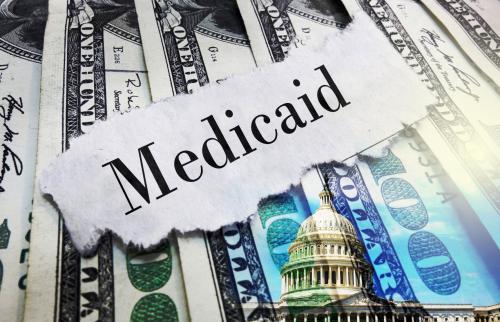What’s the latest thinking in fiscal and monetary policy? The Hutchins Roundup keeps you informed of the latest research, charts, and speeches. Want to receive the Hutchins Roundup as an email? Sign up here to get it in your inbox every Thursday.
Deep recessions generate long-lasting, negative effects on growth
Deep recessions depress economic activity at least a decade into the future, according to David Aikman of King’s College London and co-authors. For the most severe recessions — the worst 5% — this translates to a permanent loss in real GDP of 4.75% over the course of 10 years. These negative effects are present regardless of the recession’s cause (e.g. a financial crisis or an oil shock). Less severe recessions — those in the bottom 80% of the severity distribution — tend to have no impact on long-term growth. Policies that mitigate the impact of large shocks may therefore generate outsized effects, the authors say.
Workers without early retirement options suffer adverse consequences
Using Spanish Social Security data, Cristina Bellés-Obrero and Han Ye of the University of Mannheim and Sergi -Martín of Universitat Pompeu Fabra find that delaying retirement has adverse effects on individuals. People in Spain who entered the workforce before 1967 could take early retirement pensions at age 60; those who entered after 1967 had to wait until age 65 to claim pensions. Workers in the second group left the workforce about half a year later, died before retiring more frequently, and were much more likely to retire with disability pensions. Mortality between the ages of 60 to 69 in this group was higher among nearly all workers in the second group compared to those who had the earlier retirement option, but the effects were especially large among those with blue-collar, physically demanding jobs such as manufacturing and construction. The authors suggest that the recent increases in the statutory retirement age in many countries may keep social safety nets financially solvent but impose high costs on the workforce.
Work from home will lower the value of commercial real estate in the United States by $453 billion
Arpit Gupta of New York University and Vrinda Mittal and Stijn Van Nieuwerburgh of Columbia Business School study the effects of post-pandemic remote work on the commercial office sector. Using transaction-level data for a large sample of office leases, stock returns on real estate investment trusts, and online job postings by firms to track whether jobs are remote, they estimate that office valuations across the U.S. in 2029 will be 39%—or $453 billion—lower than pre-pandemic levels. Higher quality office buildings will be less affected by the shift to remote work due to a flight to quality, they find, while lower quality office buildings will suffer much larger declines. The authors warn that the value destruction could activate a “fiscal doom loop”: lower downtown property tax revenues lead to fewer amenities, which decreases the attractiveness of a city as a place to live, and thereby further reduces tax revenues and amenities.
Chart of the week: Number job openings is falling
 Chart Courtesy of FRED
Chart Courtesy of FRED
Quote of the week:
“While oil and gasoline prices have come down in recent months, I am concerned that fluctuations in prices of the goods to which people pay the most attention, like food and housing, will affect expectations of future inflation. Thankfully, longer-term inflation expectations appear to remain well anchored, consistent with our 2% target. I will be watching those expectations closely,” says Philip N. Jefferson, member of the Federal Reserve Board of Governors.
“…Restoring price stability may take some time and will likely entail a period of below-trend growth. However, I want to assure you that my colleagues and I are resolute that we will bring inflation back down to 2%. The full effects of monetary policy take time, but in my brief time on the Federal Open Market Committee, we have acted boldly to address rising inflation, and we are committed to taking the further steps necessary.”
The Brookings Institution is financed through the support of a diverse array of foundations, corporations, governments, individuals, as well as an endowment. A list of donors can be found in our annual reports published online here. The findings, interpretations, and conclusions in this report are solely those of its author(s) and are not influenced by any donation.
The Brookings Institution is committed to quality, independence, and impact.
We are supported by a diverse array of funders. In line with our values and policies, each Brookings publication represents the sole views of its author(s).







Commentary
Hutchins Roundup: Deep recessions, early retirement, and more
October 6, 2022